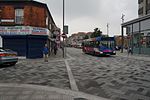River Freshney

The River Freshney is a river in the English county of North East Lincolnshire. The town of Grimsby stands on its banks. It rises from at least four springs on the edge of the Lincolnshire Wolds, although local folklore and oral tradition has it springing from Welbeck Hill. Originally it entered the tidal Humber estuary at Pyewipe, north west of Grimsby, but has been re-routed and now supplies Grimsby Docks. There was an existing haven within the borough of Grimsby but this suffered greatly with silting problems so in 1669 landowners agreed to the diversion of the Freshney through the town to the haven to provide fresh water and improve the flow. It is believed the work was completed in the very early 18th century.
Excerpt from the Wikipedia article River Freshney (License: CC BY-SA 3.0, Authors, Images).River Freshney
Victoria Street South,
Geographical coordinates (GPS) Address Nearby Places Show on map
Geographical coordinates (GPS)
| Latitude | Longitude |
|---|---|
| N 53.567877 ° | E -0.08289 ° |
Address
Stagecoach bus depot
Victoria Street South
DN31 1PS , Holme Hill
England, United Kingdom
Open on Google Maps








